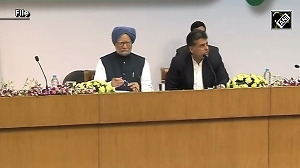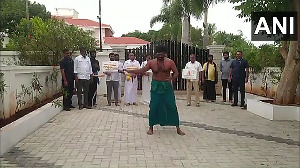Asserting his stewardship of India's diplomacy, Prime Minister Manmohan Singh on Monday constituted a panel called the Trade and Economic Relations Committee.
This committee will advise the government on economic initiatives it can take in foreign policy and plan the architecture of such initiatives in such a way that they do not run aground.
The committee will co-ordinate all economic and trade relations between India and other countries.
Citing examples of the "free- trade agreements" with Thailand and Sri Lanka, which were announced by the previous government but saw a lot of problems in implementation, Sanjaya Baru, PMO spokesman, said the committee would at once work to remove co-ordination hurdles, suggest new and fresh ideas in economic diplomacy and back foreign policy with economic muscle.
The committee, the first of its kind, will be headed by the Prime Minister and will have as members the finance minister, foreign minister, minister for commerce and industry, deputy chairman of the Planning Commission, chairman of the Economic Advisory Council and the chairman of the Manufacturing Competitiveness Council.
Any other minister can be called to the committee on a case to case basis. Secretaries to all these ministries will also be called in to meetings.
The committee will both plan and co-ordinate--it will visualise problems arising out of economic initiatives but will also suggest forward-looking moves that will dovetail with India's political ambitions.
"This will bring professional input into decision-making. All the individuals on the committee are experts in their own fields. This committee will be a think tank-cum-implementation agency," Baru said.
He said it was neither a Cabinet committee nor a group of ministers. Therefore, the Cabinet secretary was not on it and nor did it comprise only Cabinet ministers. The panel is envisaged as leap-frogging the movement of files by upgrading the level of decision-making in economic diplomacy.
Baru said, for instance, the fast track freight corridor project with Japanese assistance had all the potential of getting mired in file movement was something the panel would prevent from happening.
He also said the Commercial and Economic Co-operation Agreement with Singapore, which should be signed at the end of the month, was an example of the kinds of projects the committee would undertake with other countries, but eliminating the delay in drafting the FTA.
For some time now, the Prime Minister has been involving himself with foreign policy decisions, often sending the ministry of external affairs into a tailspin with departures from the script.
The interaction with King Gyanendra of Nepal, the tone to be set for his meeting with Pakistan President Pervez Musharraf and even his engagements with Bangladesh, have had a uniquely prime ministerial stamp.
The external affairs has ignored suggestions that it might be wise for the Prime Minister to have a diplomatic adviser. The setting up of this panel can have the effect of undermining the ministry of external affair's role in conducting and directing foreign policy.






 © 2024 Rediff.com -
© 2024 Rediff.com -